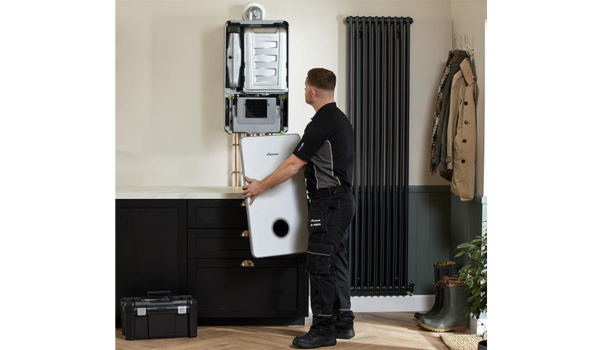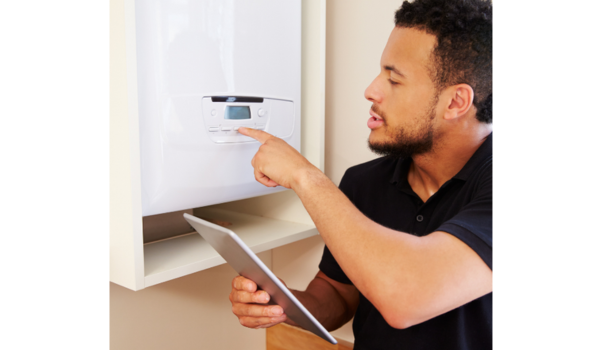Boiler Plus compliance is a legal requirement that falls under UK Building Regulations. Yet, while everyone from boiler manufacturers to the end-consumer is affected by Boiler Plus, the installer has the most direct responsibility for ensuring compliance. Homeowners and landlords also need to be aware of the regulations to ensure they hire a competent and trustworthy professional who will complete the work legally and to a high standard.
At City Plumbing, the home of heating, we’re committed to helping all those in the trade get access to the necessary products needed to get the job done safely, as well as offering help and guidance on current requirements facing the industry.
Here we consider the Boiler Plus Compliance initiative in further detail while highlighting the responsibilities faced by installers when carrying out their work.
What is Boiler Plus?
Boiler Plus is a UK government initiative introduced in April 2018 to improve the energy efficiency of domestic heating systems. It sets new standards for the installation of new boilers in England, with the primary goals of reducing carbon emissions and helping homeowners save on their energy bills.
The regulations are a legal requirement for all new and replacement boiler installations and are part of the broader Building Regulations.

The Two Main Pillars of Boiler Plus
Boiler Plus has two key requirements that all new gas and oil boiler installations must meet:
1. Minimum Efficiency Standard:
- All new gas and oil boilers installed in existing homes must have a minimum ErP (Energy-related Products) efficiency rating of 92%. This standard ensures that all new boilers are highly efficient condensing models, which recover heat from the waste flue gases that would otherwise be lost.
2. Heating Controls:
- The new boiler installation must include time and temperature controls. This is often referred to as a "boiler interlock," which means the boiler is automatically switched off when there is no demand for heat or hot water from the thermostat or timer. This prevents the boiler from running unnecessarily and wasting energy.
Additional Requirements for Combi Boilers
For new or replacement gas combination (combi) boilers, there is a third, additional requirement. The installation must include at least one of the following four energy-saving measures:
- Flue Gas Heat Recovery (FGHR): This is a device that recovers heat from the hot flue gases to preheat the cold water entering the boiler, further boosting efficiency. Some modern boilers have this feature built in.
- Weather Compensation: This control uses an external sensor to monitor the outdoor temperature and automatically adjusts the boiler's flow temperature accordingly. This means the boiler works harder on colder days and less on warmer days, maintaining a consistent indoor temperature with less energy consumption.
- Load Compensation: This type of control works by measuring the difference between the current room temperature and the target temperature. It then modulates the boiler's output to use only the amount of fuel needed to close that gap, rather than running at full power all the time.
- Smart Thermostat with Automation and Optimisation: A smart thermostat can meet the Boiler Plus requirement if it has two specific functions:
- Optimisation: The device calculates how long it takes to heat the home and turns the boiler on at the most efficient time to reach the desired temperature by the scheduled time.
- Automation: The device can automatically adjust the heating schedule based on programmed demand or occupancy detection (e.g. using geolocation from your smartphone to know when you're home).
Why Was Boiler Plus Introduced?
The main motivations behind Boiler Plus are:
- Energy Efficiency: To ensure that homeowners are not just getting an efficient boiler, but also an efficient heating system as a whole. The added controls help the boiler and radiators work together to use the least amount of energy possible.
- Carbon Reduction: By making heating systems more efficient, the legislation aims to reduce the UK's overall carbon emissions from residential homes.
- Cost Savings: The measures mandated by Boiler Plus are designed to help consumers better manage their heating and, in turn, save money on their energy bills in the long run.

Most Commonly Asked Questions About UK Boiler Plus Compliance
Boiler Plus has been a significant change for the UK heating industry, and it's brought up a number of questions from both installers and homeowners. Here are some of the most commonly asked questions about Boiler Plus compliance:
1. Does Boiler Plus apply to all boiler installations?
- No, not exactly. It applies to all new and replacement gas and oil boilers installed in existing domestic dwellings in England.
- Exceptions: It does not apply to boiler replacements in new-build properties (as they are already subject to different, stringent Building Regulations) or in Scotland and Wales (although they have their own, similar regulations in place).
2. What happens if I don't comply?
- For Installers: If an installer fits a boiler that isn't Boiler Plus compliant, they're in breach of Building Regulations. This can lead to prosecution by local Building Control, fines, and potential suspension or removal from the Gas Safe Register. The installer is responsible for ensuring the work is compliant, even if a homeowner requests otherwise.
- For Homeowners: Homeowners also have a legal responsibility to ensure that work on their property complies with Building Regulations. If they knowingly allow non-compliant work, they can face prosecution and a fine of up to £5,000. It's in the homeowner's best interest to ensure their installer is following the rules.
3. What is the difference between the requirements for a combi boiler and a regular/system boiler?
- All Boilers (Combi, Regular, System): Must meet the minimum 92% ErP efficiency standard and have a boiler interlock with time and temperature controls.
- Combi Boilers (Additional Requirement): These boilers must also include one of the four specific energy-saving measures:
- Flue Gas Heat Recovery
- Weather Compensation
- Load Compensation
- A Smart Thermostat with automation and optimisation functions.
4. What is the most common way to meet the additional requirement for combi boilers?
- While all four options are valid, installing a smart thermostat with load compensation or optimisation is a very popular choice. Many modern smart thermostats on the market today are specifically designed to be Boiler Plus compliant. This is often the most straightforward and cost-effective option for the homeowner, as it provides them with more control and potential for energy savings.
5. Does my current boiler need to be upgraded to meet Boiler Plus?
- No. Boiler Plus regulations are only triggered when you install a new or replacement boiler. There is no requirement to retrofit your existing boiler to comply with the new standards.
6. Do the controls need to be from the same manufacturer as the boiler?
- No, not necessarily. However, many boiler manufacturers recommend using their own brand of controls as they are designed to "speak the same language" as the boiler. This ensures maximum efficiency and functionality. Third-party controls can be used as long as they provide the required functionality (e.g. load compensation) to meet the regulations.
7. Does Boiler Plus apply to landlords?
- Yes. If a landlord is installing a new or replacement boiler in a tenanted property, it must comply with Boiler Plus, just like a homeowner's property. The regulations apply to all domestic dwellings in England.
8. Will these extra measures increase the cost of a new boiler?
- In the short term, yes, adding the required controls may increase the initial installation cost. However, the government's stance is that these measures will lead to significant long-term savings on energy bills, often recovering the upfront cost in a relatively short period of time.
City Plumbing Can Help Installers Navigate Boiler Compliance
Ultimately, Boiler Plus is about more than just fitting a new, efficient boiler. It's a set of regulations that ensures new heating installations in the UK are fully optimised with intelligent controls to deliver maximum energy efficiency and cost savings for the homeowner.
With a dedicated website created to help those in the trade complete all their projects on time and on cost, all the while safely, City Plumbing remain your number one choice for all heating products and advice.
City Plumbing is here to help and provide support to all those in the trade working on getting the job done while staying within regulations. Take a further look at our website for further information on how we can help you stay compliant.




